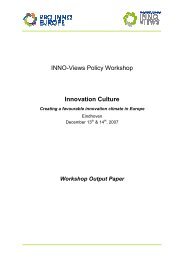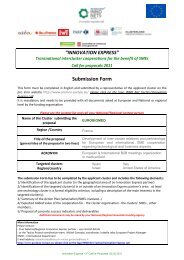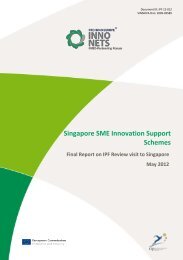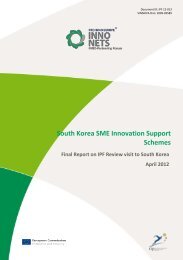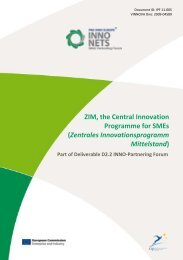Benchmarking National - PRO INNO Europe
Benchmarking National - PRO INNO Europe
Benchmarking National - PRO INNO Europe
Create successful ePaper yourself
Turn your PDF publications into a flip-book with our unique Google optimized e-Paper software.
The patent troll as an SME-affine example of new IPR-related<br />
business models<br />
The term “patent troll” basically describes a patent owner, often a SME, that<br />
enforces patent rights against accused infringers, but does not actually<br />
produce or supply services based on the patents in question. Though<br />
definitions of the terms vary, a key constituting factor seems to be especially<br />
that the trolls are in a position to negotiate licensing fees which are grossly<br />
out of alignment with their contribution to the alleged infringer’s product or<br />
service.<br />
Being a patent troll is actually not unlawful as such. Proponents of patent<br />
trolls underline that such companies increase the liquidity of IP by providing<br />
a ready market for patents which the respective inventors cannot exploit or<br />
commercialize. Furthermore, patent trolls are said to facilitate legal access to<br />
IP by pooling (licensing, aggregating) patents governing a certain technology<br />
from different origins/inventors. Finally, a positive influence on innovation is<br />
ascertained as the troll’s activities are said to provide incentives for the<br />
making, and public disclosure, of new inventions.<br />
By contrast, critics point to the increased costs for manufacturers that need<br />
to be taken account of as a precautionary measure, due to the possibility of<br />
having to pay royalties for IP not owned. They also point to higher costs for<br />
product developers, because patent databases have to be monitored more<br />
closely. All in all, patent troll SMEs can be highly successful on their own and<br />
even important because of market-functioning considerations, but they are in<br />
turn also a potential threat to other companies – be it SMEs or large<br />
enterprises.<br />
The implications for SMEs seem to be threefold:<br />
� SMEs should be at the last aware of the IPR system. Even if they don’t<br />
use formal IPR, it is still advisable that they monitor the IPR environment of the<br />
business regularly. This is especially true for SMEs operating in High-Tech<br />
sectors, but even for industries where patents do not yet play a role it could<br />
prove helpful to stay alert – given the tendency that the borders between<br />
traditional industries get increasingly blurred and the tendency that over time<br />
more and more types of innovations tend to become subject to some type of<br />
IPR regime.<br />
� SMEs should adopt a strategy on IPR and integrate it into overall<br />
(innovation) management. SMEs should be, as a pre-requisite, able to<br />
assess the value of their IP. This would imply that they also are able to consider<br />
how to put IP to its best use. The key issue with an IPR strategy is that it may<br />
not (only) be a protection strategy, but it can also constitute a new way of<br />
doing business.<br />
� There should be by no means a predisposition towards patenting.<br />
Patenting is only one of the tools available for using IP (rather than only<br />
protecting IP), and informal tools, such as trade secrets or defensive publishing<br />
have a rightful place within the current IPR framework. Patents may be the<br />
primary choice on many or perhaps even most occasions – but to patent<br />
without proper risk assessment and with no means to litigate could prove<br />
disastrous. Similarly, patenting without a proper well-defined goal could lead<br />
to money being wasted.<br />
41<br />
SMEs IN THE IPR WORLD






